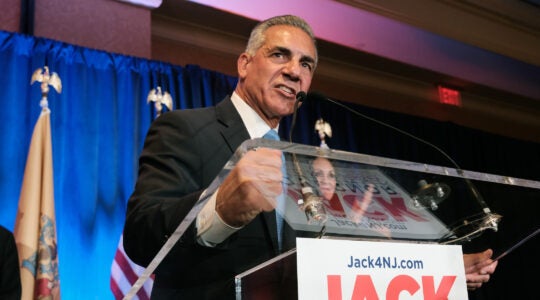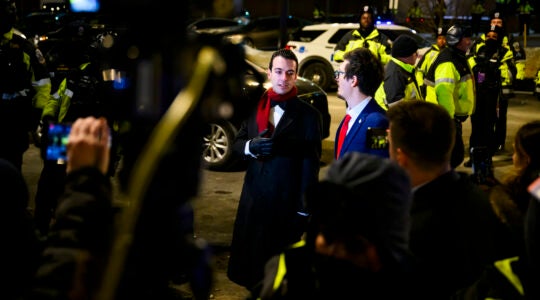CLEVELAND (JTA) – Like a lot of the other prizes in this year’s presidential landscape, Ohio’s Jewish community should be Clinton country: Fierce pro-Israel sentiments are wedded to a tradition of advocacy for the domestic issues that U.S. Sen. Hillary Rodham Clinton (D-N.Y.) has championed.
But pushback from the cadre of young campaigners working for U.S. Sen. Barack Obama (D-Ill.) and an impassioned direct plea from the candidate himself appear to be having an impact in the community.
In off-the-record chats, some of Clinton’s Jewish supporters in Ohio told JTA that they are now questioning if she’s viable as a candidate and are giving Obama a second look.
The degree to which the Obama campaign has made a prize of the 80,000-strong Jewish community in the Cleveland area was made clear Feb. 24 when the candidate met with the city’s Jewish leaders in a private meeting and when his chief Jewish surrogate, U.S. Rep. Robert Wexler (D-Fla.), took questions a few hours later from a crowd of 500 at a local synagogue.
Obama suggested to the leaders that a driving force in his Jewish campaign was fighting back against an Internet campaign depicting him as everything from a secret Muslim to being surrounded by advisers who are soft on Israel.
“I don’t think that we are in an era anymore where you can just ignore these things and not dignify them,” Obama told the 150 leaders at a suburban meeting hall. “There was a time when they would be amplified as consequence of you calling attention to it. I don’t think that’s the case anymore because of our media age.
“You know we saw what happened with the Swift boat situation back in 2004,” he added, referring to distorted and false attacks on the military record of U.S. Sen. John Kerry (D-Mass.), then the Democratic presidential candidate. “And so what we’ve done is try to lift it up and actively debunk it and encourage stories about it.”
Obama’s campaigners in Ohio say there is more to the Jewish campaign than simply quashing innuendo before it becomes a threat: The big prize is a key primary state that once trended strongly for Clinton but recent polls show could be up for grabs in the March 4 vote.
Steve Dettelbach, a former prosecutor now in private practice in Cleveland who was friends with Obama at Harvard Law School, but is not formally associated with the campaign, says his efforts on behalf of the candidate are emblematic: The Obama campaign supplies him with material dismantling the Internet attacks, he passes it on to Jewish friends and ends up bringing them aboard.
“My predominant experience is that I go through the process of explaining it and they become Obama supporters,” he said, attributing the enthusiasm to Obama’s “campaign of ideas,” emulating the civil rights movement of yore.
“The soaring ideas are very important,” said Dettelbach, 42. “The Jewish community looks back with nostalgia to the 1960s, civil rights, marching with Dr. King, solidification of support for Israel, and they see Obama bringing that energy back to government.”
Wexler made the point in addressing the Anshei Chesed-Fairmount synagogue in suburban Cleveland, recalling that its late rabbi, Arthur Lelyveld, marched with the Rev. Martin Luther King and suffered beatings for his civil rights activism.
“He was an extraordinary hero,” Wexler said to murmurs of agreement before pivoting to Obama’s campaign, describing the effects of an Obama presidency on Israel and America’s place in the world after years of what he said was a neglect of alliances by President Bush.
“When that new day of trans-Atlantic relations emerges, Israel too will be a great beneficiary,” he said.
Gayle Horwitz, who last month was selected to run as an Obama delegate for the state’s 11th District in the March 4 primary, knew the odds were against her.
In other districts, a relatively high African-American constituency would translate into a strength for Obama, but in the 11th Clinton has the support of the hugely popular U.S. Rep. Stephanie Tubbs Jones, an African-American Democrat who refers to Clinton in radio ads as “my girl.”
The other substantial constituency in the 11th, which straddles downtown Cleveland and its eastern suburbs, is its Jewish community.
That’s what Horwitz, 27, and her twentysomething colleagues decided to target.
“I looked at the demographics and the exit polls and I saw that if we did outreach, we could pick up one or two delegates,” said the Georgetown Law School graduate.
The campaign has been methodical, with its fresh-faced young people trudging through the snow to go door to door, and meeting in strategy sessions with top officials. Campaigners recently met with Wexler at Corky and Lenny’s, a suburban Jewish haunt, and traded tips on how to reach skeptical Jewish voters.
Horwitz said she asks Jewish friends to forward anti-Obama e-mails as soon as they receive them. She then immediately blasts all the recipients in the forward string with explanatory material.
Jewish Democrats say the rapid-response tactics are having an effect.
Rob Zimmerman, a lawyer and a Shaker Heights councilman, heads the local National Jewish Democratic Council chapter and is a senior official in the local party. Zimmerman, 41, had leaned Clinton, but is now reconsidering simply because of the intensity of Obama’s Jewish campaign and what he said was the silence from the Clinton camp.
“I’ve been getting e-mails, phone calls three to four times a day from people who have connections” to the Obama campaign, Zimmerman said in his downtown Cleveland office overlooking Lake Erie. “On the flip side there’s been next to no outreach from the Clinton campaign.”
In a late move, after it was clear that Obama was making a big Jewish push in the state, the Clinton campaign put together an event Monday night featuring a talk by one of the New York senator’s supporters, former U.S. diplomat and Middle East negotiator Martin Indyk.
About 150 people turned up to hear Indyk. The former negotiator told the room that Clinton had a stronger understanding of the region and said Obama’s pledge to meet with Iranian leaders within his first year as president was “naive.”
Like so many other challenges now facing the Clinton campaign, the failure to match the Obama camp’s moves in Ohio is a case of anticipating that her campaign would be wrapped up by the Super Tuesday primaries on Feb. 5.
“We didn’t think Ohio was going to be a player,” said Lana Moresky, one of Clinton’s top fund-raisers in the state. “People are now starting to focus.”
Clinton’s longer record of support for Israel, her tendency to hew to pro-Israel orthodoxies and her nuts-and-bolts emphasis on issues plaguing Ohio – job creation, health care and mortgage relief – made her a natural for the Jewish community.
Along with Tubbs Jones and Gov. Ted Strickland – both popular with Ohio Jews – she had the endorsement of the state’s top Jewish official, Lt. Gov. Lee Fisher. The Jewish attorney general, Marc Dann, has not endorsed a candidate.
In Moresky, Clinton is said to have the backing of the state’s most successful fund-raiser for Kerry in ’04. Plus she has the support of Sandy Wuliger, whose husband, investor Tim Wuliger, is a past national chairman of the American Israel Public Affairs Committee.
Obama’s highest-profile Jewish backer in the state is Ron Ratner, a top property developer in the city and member of a prominent family. His 23-year-old son, Matt, is a paid organizer for the campaign.
Older women are a natural constituency for Clinton, said Tracy Turoff, a Cleveland lawyer who was selected to be a Clinton delegate.
“I have a lot of friends in my peer group supporting Hillary,” said Turoff, 36, who is active in a number of Jewish causes.
She added, “I have more women friends in their 40s and 50 who are heavily leaning toward Hillary. The idea of having a woman president, not just a woman president but a capable one – a proven, experienced candidate – is compelling.”
That sentiment was echoed by Sandra Kaufman, a retired antiques dealer having breakfast with friends at Corky and Lenny’s the same day that Obama addressed Jewish leaders.
“It would be wonderful to have a woman in the White House,” Kaufman said, noting that she was switching her primary vote from Republican to Democrat this year so she could vote Clinton.
She nodded in agreement with her friend Barbara Goldberg saying that Obama supporters were “voting image.”
“He’s rah-rah,” Kaufman added. “I can’t believe people are backing him for no reason.”
Merle Gordon, who struggled nine years as a Cleveland councilwoman to ameliorate the deterioration of her ward, said Clinton’s hands-on experiences impressed her.
“You learn from your war wounds,” she said, referring both to her own experiences and to Clinton’s failed attempt as first lady to introduce universal health coverage in 1993. “I haven’t seen Obama trying to galvanize people around an issue. There hasn’t been the questioning of his policies and ideas.”
Gordon, 38, stepped down as a councilor in 2005. She likened her experiences of overcoming constituent and peer hostility to her Jewishness in her white, working-class ward to Clinton’s work with senators who sought her husband’s impeachment.
“It’s hard to stand with someone who’s been an enemy of yours,” she said.
The image vs. substance question plagues Jewish Obama backers as they work to win voters. On Middle East issues, they note that his authoring a bill that would enable states to disinvest from Iran currently under consideration by the U.S. Senate and that his pro-Israel statements date back to his time in the Illinois state Senate when he backed the purchase of Israel bonds.
“Senator Obama has a lifelong commitment to Israel’s security,” Wexler told JTA after the outreach event. During the event, however, faced with complaints that Obama’s Israel record was unclear, he acknowledged, “By virtue of the fact that people are asking, we need to do more, no doubt.”
It seemed to be working.
“I am now more favorably disposed toward Obama,” said Rabbi Rona Shapiro of the nearby Bethaynu congregation, who had come to the event worrying about Obama’s seeming lack of an Israel record.
Her congregant, Lynn Danzig, agreed.
“This is a senator from Illinois I want to know more about,” the homemaker said.
Both women had been leaning toward Clinton.
Those attending the Feb. 24 morning meeting between Obama and Jewish leaders said there was a similar impression, especially among older women donors to Clinton who were now worrying that the New York senator’s campaign was veering into “good money after bad” territory.
The favorable shift came even though Obama had bluntly confronted what he said was the “pro-Likud” orthodoxy among some in the pro-Israel community –- in a Jewish community that leans right on Israel and in a room that included people who were, indeed, close to the Israeli opposition party that backs minimal concessions to the Palestinians and expanded settlement.
“I think there is a strain within the pro-Israel community that says unless you adopt a unwavering pro-Likud approach to Israel that you’re anti-Israel and that can’t be the measure of our friendship with Israel,” Obama said. “If we cannot have an honest dialogue about how do we achieve these goals, then we’re not going to make progress.”
The reaction was a slightly discomfited silence. Still, supporters said, the confrontation comported with a candidate who on Martin Luther King Day told a church full of black leaders that they needed to confront anti-Semitism and homophobia in the community – and it might have helped him.
“He comes to these decisions with a lot of thought and experience and a lot of substance,” said Ari Maron, 29, a property developer who attended the meeting and backs Obama.
“When he says something about maintaining a strong Jewish state, you know those things are not about a campaign but about a position that he’s come though with a lot of thought.”
JTA has documented Jewish history in real-time for over a century. Keep our journalism strong by joining us in supporting independent, award-winning reporting.





